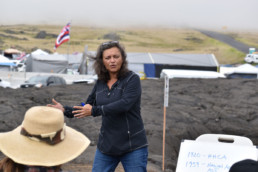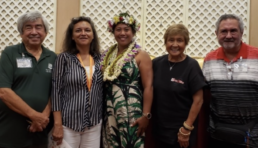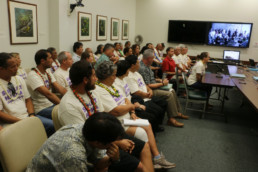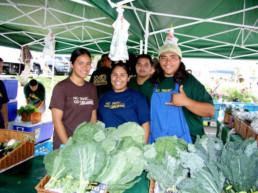Rural LISC Invests funds in native Hawaiian Community Development Nonprofit
Anahola, Hawaii — the Rural Local Initiatives Support Corporation (LISC) has awarded $26k to the Homestead Community Development Corporation (HCDC), a statewide non-profit serving native Hawaiian trust land communities.
Funding will be invested in HCDC programming that promotes an art district on Kauai, and another program that assists native Hawaiian families to upgrade residential septic systems.
“We appreciate the consistent partnership with Rural LISC over the last few years,” said Iwalani McBrayer, HCDC board chairman. “This national organization has helped HCDC to build our internal capacity, and with this year’s award, is helping to leverage HCDC’s own funding to support the art community and homeowners on homesteads.”
Rural LISC is a national intermediary that invests in and builds the capacity of over 89 rural community development nonprofit partnerships. Investments include training, lending and tax credit capital as well as equity grants. Rural LISC’s investment in rural America have totaled $1.25 million and produced over 35,000 affordable homes and apartments and created over 12,000 jobs. Rural LISC is committed to making rural communities good places to live, work, do business and raise children.
“The Anahola Marketplace on Kauai, where HCDC is creating an art district is an important effort to diversify the economy in a rural Hawaiian home land community,” said Robin Puanani Danner, HCDC CEO. “Our best hopes are to replicate the open air marketplace here on Kauai, in other homesteads around the state.”
A portion of the LISC funding award is also dedicated to an HCDC program that helps native Hawaiian families upgrade older septic systems, especially important on neighbor islands where access to waste water facilities are limited.
HCDC, founded in 2009, is dedicated to affordable housing and job creation on or near Hawaiian home lands. It is the nonprofit affiliate of the Sovereign Council of Hawaiian Homestead Associations (SCHHA), founded in 1987 to advance the rights of native Hawaiians s to access their lands under the congressionally enacted Hawaiian Homes Commission Act of 1920.
For more information, contact info@hawaiianhomesteads.org.
Rural LISC Invests in Native Hawaiian Homestead Nonprofit
Anahola, Hawaii — The Rural Local Initiatives Support Corporation (LISC) has awarded grant funding to the Homestead Community Development Corporation (HCDC), a statewide nonprofit serving native Hawaiian trust land communities, to support economic development and healthy housing activities.
HCDC applied for two competitive Rural LISC initiatives: the Rural LISC Cohesive Economic Development Arts and Culture Initiative; and the Rural LISC Wells Fargo Healthy Housing Initiative. Arts and Culture funding will be invested in HCDC programs that promote an art district on Kauai; and a direct investment from Wells Fargo will support a portion of the LISC funding award dedicated to an HCDC program that helps native Hawaiian families upgrade older septic systems – especially important on neighbor islands where access to waste water facilities are limited.
“We appreciate the consistent partnership with Rural LISC over the last few years,” said Iwalani McBrayer, HCDC board chairman. “This national organization has helped HCDC to build our internal capacity, and with this year’s award, is helping to leverage HCDC’s own funding to support the art community and homeowners on homesteads.”
“Rural LISC is committed to improving housing conditions throughout rural America,” said LISC Vice President and Rural LISC Director Suzanne Anarde. “We are proud to support HCDC in their efforts to improve septic systems for Native Hawaiian families. But we couldn’t do it without the support of the Wells Fargo Housing Foundation. Wells Fargo’s support has been critical in sustaining this rural work throughout the years. The long-term positive impacts on generational health and education outcomes – impacts that result from having a safe and healthy home – are undeniable,” she said.
Rural LISC is a national intermediary that invests in and builds the capacity of 86 rural community-based organization partners. Investments include financial resources, including grants, equity and low-cost loan funds; technical assistance; and training. Rural LISC’s investment in rural America totals $1.25 million and has produced more than 35,000 affordable homes and apartments and created over 12,000 jobs. Rural LISC is committed to making rural communities good places to live, work, do business and raise children.
“The Anahola Marketplace on Kauai, where HCDC is creating an art district is an important effort to diversify the economy in a rural Hawaiian home land community,” said Robin Puanani Danner, HCDC CEO. “Our best hopes are to replicate the open air marketplace here on Kauai, in other homesteads around the state.”
HCDC, founded in 2009, is dedicated to affordable housing and job creation on or near Hawaiian home lands. It is the nonprofit affiliate of the Sovereign Council of Hawaiian Homestead Associations (SCHHA), founded in 1987 to advance the rights of native Hawaiians to access their lands under the congressionally enacted Hawaiian Homes Commission Act of 1920.
For more information, contact info@hawaiianhomesteads.org.
Roundtable on Preventing Homelessness & Foreclosures Scheduled with Lieutenant Governor Green in October 2019
Honolulu, HI — The Sovereign Council of Hawaiian Homestead Associations (SCHHA) has scheduled a Roundtable with Lieutenant Governor Josh Green on avoiding homelessness on Hawaiian Home Lands, through basic and common sense foreclosure prevention processes.
“There is an invisible crisis brewing on our trust lands that threatens too many families with eviction, adding to the overall Hawaii crisis of homelessness,” said Robin Puanani Danner, SCHHA Chairman. “This roundtable will engage our Lieutenant Governor in meaningful dialogue to share simple solutions that are common for all other Hawaii citizens, yet denied to native Hawaiians by state government in mitigating foreclosures.”
The SCHHA Governing Council with elected representatives from Kauai, Oahu, Maui, Molokai and Hawaii Island are charged with moving policy priorities adopted by SCHHA members, one of which is to bring forward solutions that maintain satisfactory risk levels for Lenders of Last Resort like the DHHL loan portfolio while helping struggling families to restructure loan repayments and stay in their homes.
“We have an expert team of homesteaders and partners that specialize in the lending and housing market, and we didn’t have to dig very far to identify very easy, very low risk actions to keep families in their homes,” Danner remarked. “Every-time a native Hawaiian family is evicted, you add to the waitlist, you add to homelessness and you add to the instability of children in these families – totally avoidable. Loan delinquencies are not a sign of poor character, as a former banker, I can tell you, the vast majority of them are a sign of either a major life impacting event, a tough economy, or a loan servicer that is unaware of amazing and proven techniques called mitigations.”
The Roundtable with Lieutenant Governor Green and SCHHA Executive Leaders is scheduled for October 15 at the State Capitol. SCHHA recommendations on preventing homelessness for native Hawaiians is part of a larger technical amendments bill SCHHA is calling for entitled the “Hawaiian Lands in Hawaiian Hands Act of 2020” in the next legislative session, marking 100 years since the enactment of the Hawaiian Homes Commission Act of 1920.
“We are engaged, very focused at SCHHA to bring reasonable government reforms to bear on the lives of our people,” said Sybil Lopez, SCHHA Vice Chairman. “We must do our part in working with our elected state legislators to advance homestead and waitlist well-being, it’s time to prosper.”
SCHHA was founded in 1987 and is the oldest and largest self-governing federation of homestead associations comparable to self-governing tribes on the continent and Alaska. The HHCA established a land trust with 203,000 acres to be distributed for homes, ranches, farms and mercantile businesses to native Hawaiians defined in the HHCA.
For more information on the SCHHA Roundtable, contact info@hawaiianhomesteads.org.
Homesteaders and Waitlist Hawaiians Elect Leadership to SCHHA Governing Council
Honolulu, HI – The Sovereign Council of Hawaiian Homestead Associations (SCHHA) adjourned the 2019 Homestead leadership summit on August 25, 2019 after voting members elected 5 leaders from Kauai, Maui, Oahu, Hawaii island and Molokai to the Governing Council to serve the next 4 years.
“SCHHA serves the interests of all HHCA beneficiaries, whether on the land or on the waitlist, with 41 specific homestead areas statewide, that are SCHHA members,” said outgoing SCHHA Vice Chairman Kammy Purdy of Molokai. “I’ve been in leadership positions of the SCHHA for 25 years now, and this year, I’m proud to pass the baton to the next generation, especially on Molokai to Sybil Lopez.”
The 5 member governing council seated on Sunday are Ron Kodani representing Hawaii Island, Richard Soo for Oahu, Sybil Lopez for Molokai, Robin Puanani Danner for Kauai and Kekoa Enomoto for Maui. The SCHHA constitution also includes Kamaki Kanahele, as the Chair emeritus, from Nanakuli.
Danner and Lopez from Kauai and Molokai respectively were elected unanimously by SCHHA voting members as SCHHA Chairman and Vice Chairman.
“Mahalo to all of our Homestead Associations for giving me another 4-year term as SCHHA Chairman,” Danner said. “Together with members of our Governing Council, we look forward to working with the Governor and Lieutenant Governor, with DHHL, with the Hawaiian Homes Commission, with OHA and its board of trustees, and with the state legislature to pursue solutions that fulfill the promise of Prince Kuhio to our people.”
Danner also noted that aside from state government, SCHHA engages with the federal government, because the Hawaiian Homes Commission Act of 1920 is a federal law ultimately responsible for overseeing state government in following the intent of Congress 100 years ago.
“We are hopeful and determined,” Danner said from her office on Kauai. “We know the poor performance of state government over 6 decades, where thousands have died waiting, is fixable, totally fixable. State government is missing powerful manao and experience – HHCA beneficiaries that remain when governors and directors revolve out, we are the keepers of vital knowledge and experience to make amazing improvements.”
The Sovereign Council of Hawaiian Homestead Associations was founded in 1987 and is the oldest and largest self-governing federation of homestead associations which are comparable to tribes on the continent and Alaska. SCHHA is entirely dedicated to the sovereignty and self-determination of native Hawaiians eligible under the Congressionally enacted Hawaiian Homes Commission Act of 1920, similar to Indian Allotment Acts of the same policy era. The HHCA created 203,000 acres of trust lands to be distributed for homes, ranches, farms and businesses of native Hawaiians of 50% blood quantum or more.
Robin Puanani Danner
SCHHA Chairman & Homestead Housing Authority CEO
SCHHA Leaders Work on State Legislation for 2020 Legislature – To Improve Homesteads
Kapolei, Hawaii – The Sovereign Council of Hawaiian Homestead Associations (SCHHA) leaders are working on legislation for the 2020 Legislative Session to improve getting native Hawaiian onto their lands, as defined by the Hawaiian Homes Commission Act of 1920 (HHCA).
“Our SCHHA leaders across the pae aina are calling on one another to advance solutions during the 2020 legislative session,” said Robin Puanani Danner, SCHHA Chairman from Kauai. “2020 is a significant milestone year, it marks 100 years since the enactment of the HHCA in 1920 – we simply must engage to make things work for the people, as Prince Jonah Kuhio Kalanianaole intended a century ago.”
The SCHHA is holding its annual Homestead Summit at the Pagoda Hotel on August 24 & 25, 2019 from 9:00 am to 5:00 pm each day. Leaders will focus on a legislative initiative called The Hawaiian Lands in Hawaiian Hands Act of 2020, to advance technical amendments and reforms to the HHCA to provide the state agency, the Department of Hawaiian Home Lands (DHHL) with clarity to move native Hawaiians onto their lands, for homes, for farms, for ranches, and for mercantile businesses.
“There are so many knowledgeable leaders on the land and on the waitlist in our SCHHA membership,” said Kammy Purdy, SCHHA Vice Chairman from Molokai. “Our annual summit next month will be solutions oriented, with a focus on The Hawaiian Lands in Hawaiian Hands Act of 2020. We must help the thousands on the waitlist, and definitely, we must get our people the lands they were promised 100 years ago, including lands to build strong businesses to prosper.”
Attendees to the Summit will work on several sections of the HHCA for technical amendments under the draft legislation, including how the Governor appoints the DHHL Director, clarifying language on the criteria to be met before DHHL is allowed to issue any lands in the trust to the general public, and establishes required foreclosure prevention mitigations that are common for all other residents in the State to help families stay in their homes. SCHHA has also identified sections of the HHCA to provide stronger guidance on the issuance of lands to those on the waitlist, as well as requiring a specific process for native Hawaiians to access mercantile lands for their businesses as defined under the 100-year old law.
“It’s clear, that over the decades, without specific federal regulations in place to guide the State DHHL, the purposes and intent of our HHCA land trust has gotten lost and even warped to serve the political agenda of people in power for a term or two whether in the Governor’s office, at DHHL, or even at the Attorney General’s office,” Danner remarked. “At the 100-year mark, we know it is time for us as native Hawaiians, to rise together, and give elected and appointed leaders very direct and specific solutions to make the HHCA work for its owners, the beneficiaries of the HHCA. That’s our goal, to do the work, and to work with our legislative branch of government, our State Senators and Representatives, on technical amendments and reforms that ensures the executive branch and DHHL can do a better job, and frankly, that honors what Prince Kuhio had in mind.”
The SCHHA mission is to ensure the implementation of the Hawaiian Homes Commission Act of 1920, end the waitlist for lands, and advance the well-being of HHCA beneficiaries and their families. For more information, contact info@hawaiianhomesteads.org or contact 808-652-0140. To attend the SCHHA Summit register and RSVP to Rolina Faagai at rolina@hawaiianhomesteads.org.
Homestead Leaders Applaud OHA for Homestead Housing Program Investment
ANAHOLA, Kauai – The Office of Hawaiian Affairs (OHA) awarded a 2-year grant of $484,114 to the nonprofit, Homestead Community Development Corporation (HCDC) also known as the Homestead Housing Authority. HCDC provides economic development and housing services, including financial literacy, foreclosure prevention, mercantile business training and tiny home technical assistance.
HCDC was founded by the Sovereign Council of Hawaiian Homestead Associations (SCHHA) in 2009 as a dedicated tax exempt nonprofit focused on affordable housing and job creation on or near Hawaiian Homelands as defined by the Hawaiian Homes Commission Act of 1920.
“We applaud and mahalo OHA for this important investment of our trust funds in the abilities and expertise of the SCHHA and HCDC,” said Kammy Purdy, SCHHA Vice Chair. “These are subject areas that our homestead leaders and our staff are experts in. The entire SCHHA Executive Council appreciates this partnership with OHA to serve homesteads.”
The 2-year grant funding will distribute $200,000, nearly half of the total grant award, directly to families through match savings accounts to help with first and last month rent deposits, or to build additional dwelling units on their homestead residential or farm lots.
“This OHA investment will also support a much needed service to help families avoid foreclosure and lease cancellation,” said Robin Puanani Danner, SCHHA Chairman and HCDC CEO. “Sharing information with the thousands of family members living in our homestead areas, on their rights and responsibilities under the HHCA, in conjunction with family budgeting and business acumen is key to successful homesteading.”
SCHHA leaders founded HCDC 10 years ago to be 100% governed by SCHHA members, to serve the growth and well-being of families on the homesteads, and to implement solutions developed by SCHHA policy leaders around housing and economic well-being.
“Most people don’t realize that roughly 70% of the residents on homesteads are less than the 50% blood quantum required under the HHCA to obtain a homestead award,” Danner commented. “These thousands of Native Hawaiians are family members of the 10,000 lessees that are eligible for a homestead award of land. We know that success for homesteaders includes the success of entire families in better understanding the Act itself, so our housing services have a deep component teaching the brilliance and simplicity of the HHCA.”
HCDC will report its impact numbers to OHA as it does to the SCHHA and other funders for its programs. In addition to building affordable housing and building economic development projects, HCDC will add a direct loan fund to serve homestead farmers and ranchers, as well as transportation loans to help beneficiary families get to jobs or to work in micro enterprise businesses.
For more information about the SCHHA or HCDC, contact info@hawaiianhomesteads.org, or Rolina Faagai, HCDC Loan Fund Manager.
Homestead Hawaiian Leaders to Attend National Rural LISC Conference convening more than 250 rural community development experts to catalyze new opportunities in rural America
Anahola, HI — The Homestead Community Development Corporation (HCDC) announces the nonprofit will send staff and board members to the 2019 Rural LISC Seminar, an annual national conference for rural community development professionals. This year’s Seminar will be held in Monticello, New York June 4-7 and will provide a unique forum to learn about new rural economic development opportunities; gain valuable insight on critical issues facing rural America such as the 2020 Census; develop asset building tools and organizational development strategies; and offer a networking environment for sharing knowledge with rural development colleagues from across the country.
“Rural LISC continues to be an important partner in our work on the trust lands of our native Hawaiian people, where we live and raise our families,” said Iwalani McBrayer, HCDC chair of the board of commissioners. “Mahalo to Rural LISC for sharing resources and knowledge to advance our mission to create jobs and affordable housing.”
LISC President and CEO Maurice Jones will welcome attendees with a keynote address. Participants will engage in three days of plenary and workshop sessions organized around:
- Economic Development – exploring new ways to catalyze economic development through downtown revitalization efforts, innovative wealth and skill-building strategies, and Opportunity Zones.
- Capacity Building – discovering how to increase organizational capacity through bridging generational differences in the workplace, asset and property management, and innovative financing tools.
- Community Development – learning about the latest rural community development trends and how to best respond to them, including the opioid crisis, transportation barriers, and fighting isolation/striving for inclusion among our LGBTQ community.
“HCED exemplifies the very best in bringing innovative programming to their community, and we are delighted that they are attending this year’s Seminar,” said Suzanne Anarde, LISC Vice President and Rural LISC Director.
About HCDC
Founded in 2009, HCDC is dedicated to job creation and affordable housing on or near Hawaiian Home Lands, a federal land trust created by the U.S. Congress under the Hawaiian Homes Commission Act of 1921. HCDC is the only nonprofit community development corporation governed by native Hawaiian leaders eligible for lands within the HHCA. For the last 10 years, HCDC has developed affordable single-family homes, several economic development projects including a certified kitchen, open-air marketplace, an enterprise center, and is embarking on a 50-unit rental housing project. HCDC is an emerging Native CDFI, delivering technical assistance on tiny homes and additional dwelling units, and is focused on delivering loan capital to family farms and ranches located on Hawaiian Home Lands to advance relevant rural jobs and economic opportunity.
About Rural LISC
Launched in 1995, Rural LISC is the rural component of the largest community development support organization in the country, called LISC (Local Initiatives Support Corporation). For 24 years, Rural LISC has partnered with rural communities, helping to forge innovative solutions that lead to prosperity and opportunity. Rural LISC’s investments in rural America have totaled $1.25 billion in grants, equity and low-cost loan funds. Rural LISC has leveraged this investment resulting in $3.3 billion from public and private sources, to produce 35,000 affordable homes and apartments, create 4 million square feet of commercial and community space, assist 700 businesses, create 12,000 jobs and support 20 early childhood centers. By generating resources and investing in the grassroots efforts of its 89 partner community-based organizations, Rural LISC is committed to making rural communities good places to live, work, do business and raise children. Learn more at www.lisc.org/rural.







